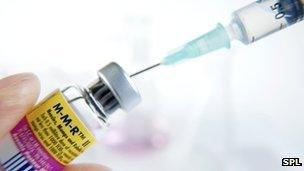Measles: 'Extra MMR jab' offer in Swansea epidemic
- Published

Health officials have been concerned about the low MMR uptake in the Swansea area
A measles outbreak affecting more than 400 people in Swansea has prompted some babies to be offered the MMR vaccine seven months earlier than recommended.
In some cases it would mean children would get three doses of MMR instead of the usual two.
Public Health Wales (PHW) said babies living in 'hotspots' of the epidemic would be offered the extra jab.
Meanwhile, a free MMR vaccination session will be held at the Princess of Wales Hospital, Bridgend, on Saturday.
A spokesman said having three doses of the vaccine was safe but only usually offered during an epidemic.
For that reason, only babies whose parents live in or travel to the 'hotspot' areas of the epidemic in Swansea and Neath Port Talbot would be offered the earlier vaccine.
Only GPs in those areas would be able to give the extra jab.
Normally children are offered the vaccine at around 13 months of age and have a booster jab between the ages of three and five.
Swansea GP Dr Dai Lloyd says parents have been queuing to have their children vaccinated
PHW had been concerned about the low number of children having the jab and had urged parents to get them vaccinated during the Easter holidays.
Some GP surgeries responded by offering extra clinics for the MMR vaccine.
Public Health Wales and Abertawe Bro Morgannwg University Health Board (ABMUHB) have organised a free MMR vaccination session for Saturday 6 April from 10:00 to 16:00 BST at the Princess of Wales paediatric outpatients department.
A spokeswoman for Bridgend council said it was aimed at children, but jabs would be available for anyone born after 1970 and who has not had measles or been vaccinated against it.
A GP in Swansea, Dr Dai Lloyd, said his surgery had seen people queuing for the vaccine following the outbreak.
Dr Lloyd said offering babies an earlier jab was safe.
"That may mean that some young children will have three MMR jabs," he said.
"That is not a problem. It is perfectly safe and perfectly effective."
He told BBC Radio Wales: "All our surgeries are very busy with parents and children worried about any cough and cold.
"That happens now because measles starts with a cough and a cold before the rash appears some days later, so we're seeing everybody now with a cough and a cold because we're in a bit of a panic situation."
"We're in an epidemic situation in Swansea so the advice we're having from Public Health Wales is [to] have an extra jab now," said Dr Lloyd.
"We're saying come in now for the extra jab but you still have the other jabs at the required time."
So far the epidemic has centred around the Swansea area although there have also been cases in the Powys and Hywel Dda health board areas.
Powys health board said it is seeing numbers rise, with cases concentrated in the north of the county.
It said 41 people were reported to have measles in March, with almost 20 in the past week.
Most of these have been in children of school age, where the disease can spread easily, it added.
Last week, PHW said it was disappointed by the number of parents who were having their children vaccinated.
It said only 100 of the 3,800 susceptible children aged over two in the Swansea area had the vaccine in the last week of March.
In Powys, one in four teenagers have not had the necessary two MMR jabs and are not fully protected against measles.
Health officials have said the epidemic has been spreading at an "alarming rate" and that more than 50 people have been hospitalised so far.
Typical symptoms of measles include fever, cough, conjunctivitis and a rash.
Life-long risk
Complications are quite common even in healthy people, and around 20% of reported measles cases experience one or more complication.
These can include ear infections, vomiting and diarrhoea, pneumonia, meningitis and serious eye disorders.
Dr Marion Lyons, director of health protection for PHW, said that children who have not been fully immunised face a life-long risk of catching measles.
She said one dose of MMR would protect 90% of children very quickly and two doses protects 99%.
- Published29 March 2013
- Published27 March 2013
- Published26 March 2013
- Published21 March 2013
- Published20 March 2013
- Published1 March 2013